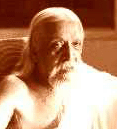| Sri Aurobindo Ghose (1872 - 1950) |
|
Indian nationalist and mystic philosopher considered a saint by many Indians. He was born in Calcutta on August 15, 1872, and was educated at the University of Cambridge. Returning to India in 1893, he became an educator and a fiery nationalist agitator. Suspected of responsibility for terrorist acts in Bengal, he was arrested in 1908 and prosecuted by the British but later acquitted.
|

|
While in prison, Ghose underwent a religious experience. When released, he abandoned politics, renounced violence, and retired (1910) to Pondicherry in southern India, where he studied Yoga, attracted a devoted group of disciples, and formed an ashram, or religious community, to further spiritual growth. In 1926, having achieved Sadhana, or the path of enlightenment, Ghose went into seclusion and gradually ceased to see his disciples. He died in Pondicherry on December 5, 1950. Ghose's teachings emphasize a two-way path to salvation.
Enlightenment comes from the divinity above, but human beings possess a spiritual "super mind" that enables them to reach upward toward illumination. Spiritual perfection is achieved through Yoga practices that lead to the ultimate fusion of these two drives.
|
|
| |
| Category filed under: Philosopher |
|
|